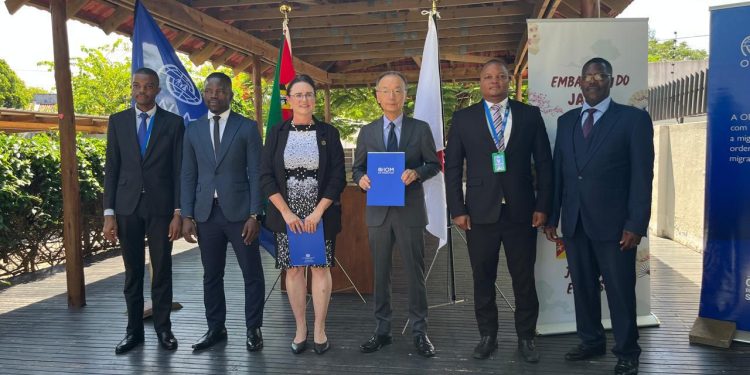- Abudo Garufo, a human rights activist in Cabo Delgado, says that much of the funding does not reach the intended beneficiary communities.
By Noémia Mendes
Maputo (MOZTIMES)—The International Organization for Migration (IOM) and the Government of Japan will disburse 11 million US dollars to enhance community and border security activities in the province of Cabo Delgado.
According to the IOM, the initiative will indirectly benefit approximately 280,000 people in the districts of Mueda, Palma, Mocímboa da Praia, Muidumbe, Macomia, Quissanga, Negomano, and Ibo.
The head of the IOM mission, Laura Tomm-Bonde, stated that the project will be implemented over the next three years and will strengthen migration coordination and security structures in areas affected by terrorism.
The project includes training 100 police officers in community policing, gender-sensitive practices, and conflict resolution. Additionally, it provides for the construction of 13 new police stations, the rehabilitation of five existing ones, and the establishment of a border crossing post in Negomano (Mueda) to improve operational efficiency and border security.
“The project will focus on three key areas: first, we will establish community structures; then, we will work on building trust between the authorities and communities; and finally, we will train police officers and construct new police stations,” said Laura Tomm-Bonde during the project’s launch ceremony on Friday (07).
In 2022, the Japanese government donated border control equipment to enhance surveillance in the border areas of Cabo Delgado and Niassa—the donation aimed to prevent the entry of terrorists. However, attacks on communities in various districts of the province continue.
Human rights activist and Cabo Delgado resident Abudo Garufo believes that much remains to be done to ensure the security of local communities.
“There are still weaknesses in the fight against terrorism. Our government is not sufficiently prepared to tackle this threat and requires adequate equipment and top-quality training to conduct an effective counterterrorism campaign,” Garufo stated in an interview.
The activist recalled that in recent weeks, residents of villages between Macomia and Awasse had abandoned their homes due to fears of terrorists in the area.
“We have witnessed several families leaving their homes, from Macomia to Awasse, due to the presence of terrorists nearby,” Garufo noted, adding that many displaced individuals sought refuge in the town of Macomia, Montepuez, and the city of Pemba.
“It is difficult to combat terrorism in the country because, often, the funding provided by these organisations does not reach the communities that should be benefiting from it,” he emphasised.
A recent study by the Centre for Public Integrity (CIP) on the security situation and socio-economic conditions of returnees in Cabo Delgado concluded that, despite improvements in districts north of the Messalo River, security in the province remains precarious.
“Terrorist attacks, which have occurred in the province since October 2017, continue as insurgents maintain military bases in the forests of Cabo Delgado,” the report states.
Terrorism has already displaced over one million people, of whom approximately 600,000 have returned to their places of origin but live in persistent insecurity due to continued insurgent attacks, kidnappings, beheadings, and the destruction of infrastructure in the province. (NM)





















